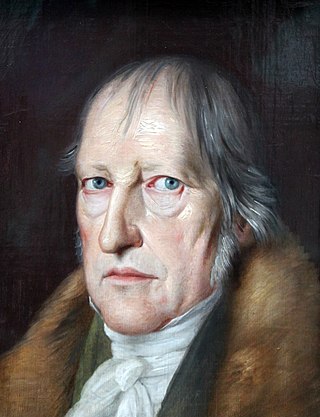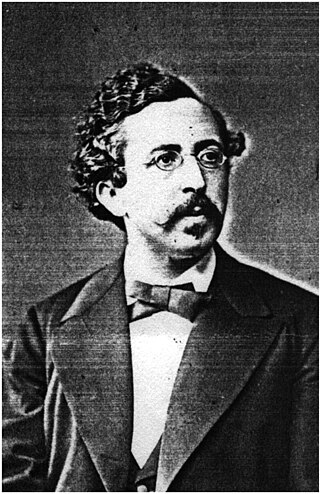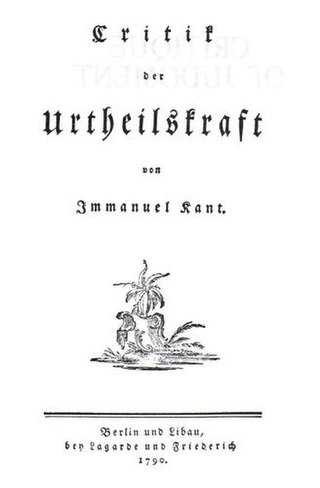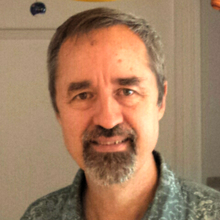The argument from morality is an argument for the existence of God. Arguments from morality tend to be based on moral normativity or moral order. Arguments from moral normativity observe some aspect of morality and argue that God is the best or only explanation for this, concluding that God must exist. Arguments from moral order are based on the asserted need for moral order to exist in the universe. They claim that, for this moral order to exist, God must exist to support it. The argument from morality is noteworthy in that one cannot evaluate the soundness of the argument without attending to almost every important philosophical issue in meta-ethics.

Georg Wilhelm Friedrich Hegel was a German philosopher and one of the most influential figures of German idealism and 19th-century philosophy. His influence extends across the entire range of contemporary philosophical topics, from metaphysical issues in epistemology and ontology, to political philosophy, the philosophy of history, philosophy of art, philosophy of religion, and the history of philosophy.

Immanuel Kant was a German philosopher and one of the central Enlightenment thinkers. Born in Königsberg, Kant's comprehensive and systematic works in epistemology, metaphysics, ethics, and aesthetics have made him one of the most influential and controversial figures in modern Western philosophy, being called the "father of modern ethics", the "father of modern aesthetics", and for bringing together rationalism and empiricism earned the title of "father of modern philosophy".
In philosophy, a noumenon is knowledge posited as an object that exists independently of human sense. The term noumenon is generally used in contrast with, or in relation to, the term phenomenon, which refers to any object of the senses. Immanuel Kant first developed the notion of the noumenon as part of his transcendental idealism, suggesting that while we know the noumenal world to exist because human sensibility is merely receptive, it is not itself sensible and must therefore remain otherwise unknowable to us. In Kantian philosophy, the noumenon is often associated with the unknowable "thing-in-itself". However, the nature of the relationship between the two is not made explicit in Kant's work, and remains a subject of debate among Kant scholars as a result.
Architectonics is the science pertaining to architecture. Architectonic means relating to or characteristic of architecture, design and construction.

Transcendental idealism is a philosophical system founded by German philosopher Immanuel Kant in the 18th century. Kant's epistemological program is found throughout his Critique of Pure Reason (1781). By transcendental Kant means that his philosophical approach to knowledge transcends mere consideration of sensory evidence and requires an understanding of the mind's innate modes of processing that sensory evidence.

Hermann Cohen was a German Jewish philosopher, one of the founders of the Marburg school of neo-Kantianism, and he is often held to be "probably the most important Jewish philosopher of the nineteenth century".

The Critique of Judgment, also translated as the Critique of the Power of Judgment, is a 1790 book by the German philosopher Immanuel Kant. Sometimes referred to as the "third critique", the Critique of Judgment follows the Critique of Pure Reason (1781) and the Critique of Practical Reason (1788).

Kantianism is the philosophy of Immanuel Kant, a German philosopher born in Königsberg, Prussia. The term Kantianism or Kantian is sometimes also used to describe contemporary positions in philosophy of mind, epistemology, and ethics.
In philosophy, transcendence is the basic ground concept from the word's literal meaning, of climbing or going beyond, albeit with varying connotations in its different historical and cultural stages. It includes philosophies, systems, and approaches that describe the fundamental structures of being, not as an ontology, but as the framework of emergence and validation of knowledge of being. These definitions are generally grounded in reason and empirical observation and seek to provide a framework for understanding the world that is not reliant on religious beliefs or supernatural forces. "Transcendental" is a word derived from the scholastic, designating the extra-categorical attributes of beings.

Tsang Lap Chuen is a Chinese philosopher in the analytic tradition. He is known for his theory of the sublime in which he presents the notion of limit-situations in life as being central to the human experience.
Mou Zongsan was a Chinese philosopher and translator. He was born in Shandong province and graduated from Peking University. In 1949 he moved to Taiwan, and later Hong Kong, remaining outside of mainland China for the rest of his life. His thought was heavily influenced by Immanuel Kant, whose three Critiques he translated from English, possibly first, into Chinese, and above all by Tiantai Buddhist philosophy.

In Kantian philosophy, a transcendental schema is the procedural rule by which a category or pure, non-empirical concept is associated with a sense impression. A private, subjective intuition is thereby discursively thought to be a representation of an external object. Transcendental schemata are supposedly produced by the imagination in relation to time.
A priori and a posteriori are Latin phrases used in philosophy to distinguish types of knowledge, justification, or argument by their reliance on experience. A priori knowledge is independent from any experience. Examples include mathematics, tautologies and deduction from pure reason. A posteriori knowledge depends on empirical evidence. Examples include most fields of science and aspects of personal knowledge.

In Immanuel Kant's philosophy, a category is a pure concept of the understanding (Verstand). A Kantian category is a characteristic of the appearance of any object in general, before it has been experienced. Following Aristotle, Kant uses the term categories to describe the "pure concepts of the understanding, which apply to objects of intuition in general a priori…" Kant further wrote about the categories: "They are concepts of an object in general, by means of which its intuition is regarded as determined with regard to one of the logical functions for judgments." The categories are the condition of the possibility of objects in general, that is, objects as such, any and all objects, not specific objects in particular. Kant enumerated twelve distinct but thematically related categories.

Religion within the Bounds of Bare Reason is a 1793 book by the German philosopher Immanuel Kant. Although its purpose and original intent has become a matter of some dispute, the book's immense and lasting influence on the history of theology and the philosophy of religion is indisputable.
Radical evil is a phrase used by German philosopher Immanuel Kant, one representing the Christian term, radix malorum. Kant believed that human beings naturally have a tendency to be evil. He explains radical evil as corruption that entirely takes over a human being and leads to desires acting against the universal moral law. The outcome of one's natural tendency, or innate propensity, towards evil are actions or "deeds" that subordinate the moral law. According to Kant, these actions oppose universally moral maxims and display self-love and self conceit. By many authors, Kant's concept of radical evil is seen as a paradox and inconsistent through his development of moral theories.

Paul Walter Franks is the Robert F. and Patricia Ross Weis Professor of Philosophy and Judaic Studies at Yale University. He graduated with his PhD from Harvard University in 1993. Franks' dissertation, entitled "Kant and Hegel on the Esotericism of Philosophy", was supervised by Stanley Cavell and won the Emily and Charles Carrier Prize for a Dissertation in Moral Philosophy at Harvard University. He completed his B.A and M.A, in Philosophy, Politics and Economics at Balliol College, Oxford. Prior to this, Franks received his general education at the Royal Grammar School, Newcastle, and studied classical rabbinic texts at Gateshead Talmudical College.
Transcendental humanism in philosophy considers humans as simultaneously the originator of meaning, and subject to a larger ultimate truth that exists beyond the human realm (transcendence). The philosophy suggests that the humanistic approach is guided by "accuracy, truth, discovery, and objectivity" that transcends or exists apart from subjectivity.
Mou Zongsan's study of Immanuel Kant has been cited as a highly crucial part in the development Mou’s personal philosophy, namely New Confucianism. Widely regarded as the most influential Kant scholar in China, Mou's rigorous critique of Kant’s philosophy—having translated all three of Kant’s critiques—served as an attempt to reconcile Chinese and Western philosophy whilst increasing pressure to westernize in China.







